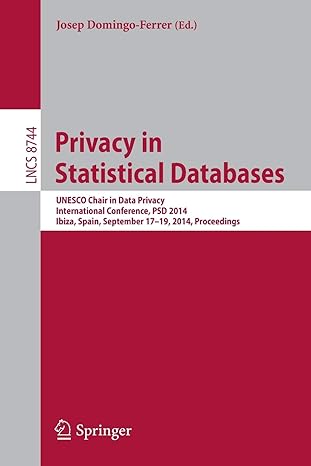Answered step by step
Verified Expert Solution
Question
1 Approved Answer
Please complete search and remove methods for Hashtable class. Any hash method can be used as long as it fits CAPACITY variable which is 11.
Please complete search and remove methods for Hashtable class. Any hash method can be used as long as it fits CAPACITY variable which is 11.
package hashtable; public class HashTableElement { public HashTableElement(Object key, Object data) { this.key = key; this.data = data; } public Object getData() { return data; } public Object getKey() { return key; } private Object key; private Object data; } package hashtable; import java.util.ArrayList; import java.util.LinkedList; /** * This class implements a simple hash table. */ public class HashTable { /** * Creates a new hash table as an array of linked lists. * The lists represent the chains of table elements that hash to the same value. * The table's size is given by the constant CAPACITY. * An auxiliary array chainLengths is also maintained that stores the * sizes of the linked lists. */ public HashTable() { chains = new ArrayList>(CAPACITY); chainLengths = new ArrayList(CAPACITY); for (int i = 0; i < CAPACITY; i++) { chains.add(new LinkedList()); chainLengths.add(0); } size = 0; } /** * Clears the hash table of all elements. */ public void clear() { for (int i = 0; i < CAPACITY; i++) { chains.get(i).clear(); chainLengths.set(i, 0); } size = 0; } /** * Inserts a hash table element into this hash table. * @param element the element to be inserted */ public void insert(HashTableElement element) { index = hash(element.getKey()); LinkedList chain = chains.get(index); chain.addFirst(element); chainLengths.set(index, chainLengths.get(index)+1); size++; } /** * Search for an element with a given key in this hash table. * @param key the key to be searched for. Must be an Integer or String. * @return the element with this key if it exists, null otherwise. */ public HashTableElement search(Object key) { // you must provide return null; } /** * Attempts to remove an element from this hash table. true is returned if * the element was removed, false if not (that is, the element was not in * the table). * @param element the element to be removed * @return true if the element was removed, false otherwise */ public boolean remove(HashTableElement element) { // you must provide return false; } /** * Returns the hash value for a given key. * Only Integers and Strings are currently supported. * @param key the key to be hashed. Must be an Integer or String. * @return the hash value for the key */ private static int hash(Object key) { Class keyClass = key.getClass(); if ( keyClass == Integer.class ) return integerHash((Integer)key); else if ( keyClass == String.class ) return stringHash((String)key); else throw new IllegalArgumentException("Hashing not supported for " + keyClass); } /** * Returns the hash value for a given Integer key * @param key the Integer key to be hashed * @return the hash value for the key */ private static int integerHash(Integer key) { // you must provide return 0; } /** * Returns the hash value for a given String key * @param key the String key to be hashed * @return the hash value for the key */ private static int stringHash(String key) { // you must provide return 0; } /** * Computes the average chain length (load factor) for this * hash table. * @return the load factor (average chain length) */ public double meanChainLength() { double sum = 0.0; for (int i = 0; i < CAPACITY; i++) { sum += chainLengths.get(i); } return sum/CAPACITY; } /** * Computes the standard deviation from the mean chain length * for this hash table. * A good hash function minimizes the standard deviation. * @return the standard deviation from the mean chain length */ public double standardDeviation() { double mean = meanChainLength(); double sum_of_squares = 0.0; for (int i = 0; i < CAPACITY; i++) { sum_of_squares += Math.pow(chainLengths.get(i) - mean, 2); } return Math.sqrt(sum_of_squares/CAPACITY); } /** * Returns the array of chain lengths for display purposes. * @return the array of chain lengths */ public ArrayList getChainLengths() { return chainLengths; } /** * Returns this hash table's size, that is, the number of elements in it. * @return the size of the hash table */ public int getSize() { return size; } /** * Gets the index of the last table slot hashed to. * @return the index of the last table slot hashed to. */ public int getIndex() { return index; } private final ArrayList> chains; private final ArrayList chainLengths; private int index; public final static int CAPACITY = 11; private int size; } Step by Step Solution
There are 3 Steps involved in it
Step: 1

Get Instant Access to Expert-Tailored Solutions
See step-by-step solutions with expert insights and AI powered tools for academic success
Step: 2

Step: 3

Ace Your Homework with AI
Get the answers you need in no time with our AI-driven, step-by-step assistance
Get Started


